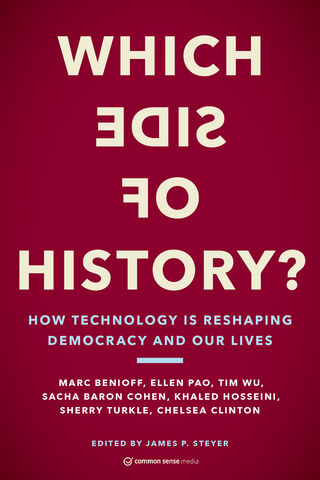Media
Will Big Tech Destroy Democracy?
Common Sense Media founder James Steyer says regulation is the answer.
Posted October 13, 2020
The internet has radically altered society. How we behave is influenced more than we realize. Morning, noon, and night we are strapped to our devices like a saddle on a horse. And most of the time we don’t realize how much they affect us.
There are good sides to the internet. We have access to more information than ever before. And advertising is not always bad. I was exposed to so many vegetable ads recently that I found myself at the farmer’s market a few days later and tried purple carrots for the first time in my life. It is true. What we subconsciously consume molds our behavior. For good or for bad. That is why children’s television banned age-inappropriate advertising on Saturday mornings. Print publications have strict laws such as no cigarette ads. But the internet on which 40% of people rely to get their daily news? No such thing exists.
It is a double-edged sword, all that background knowledge we freely give away to ‘Net Behemoths in exchange for their so-called free service. Even paid services such as Netflix reliably send me value-aligned viewing suggestions based on prior consumption to keep me coming back to their platforms. I recently binged-watched a series that was filmed in the city where I live. I giggled with recognition as the protagonist biked across the Blue Bridge with the double-spired church towers looming familiarly in the background of the scene. It brought me pleasure and with the automatic viewing loop, I was able to ingest the entire series in just two sittings.
So when Netflix subtly recommended the latest film, The Social Dilemma, I stopped dead in my tracks. I literally looked over my shoulder to see if anyone was watching because I had just pondered—not thought out loud or clicked on anything similar or made any comment referring to the vile nature of online media today—about how much social media has changed our world. I should have looked at my phone, or my Google account, or any other number of channels I regularly visit. Big Tech has its eye on us at all times. Facebook is not the product. We are.
The Social Dilemma is a 95-minute documentary about former executives who were responsible for creating the social media environment we witness today. From the co-founder of the “like” button (meant to make people feel good by sharing the love, a currency that has turned quite the opposite when absent) to former employees from Google, Pinterest, and Instagram. Every one of them, independent of the other, expressed deep remorse for the algorithm-based monster they can no longer stop. Artificial Intelligence has literally taken over. So-called “machine learning” has left its creators far behind, like Victor Frankenstein and the beast he built. Or an express train without a conductor, teetering dangerously on the edge of the rails. No way to stop it, they say? Is that true?
In a new anthology Which Side of History? How Technology is Reshaping Democracy and Our Lives, edited by Common Sense Media founder James Steyer, a multitude of voices from the likes of Salesforce CEO Marc Benioff, former NYC mayor Michael Bloomberg and former Surgeon General Vivek Murthy address the pitfalls and possibilities technology can bring to our lives.

Benioffclaims: “We need to do nothing short of reimagining the social contract for the twenty-first century.” (page 50) Tech was born to do good. In its evolution, it has started to wreak havoc that is imperiling our democracy. Through false political ads, filter bubbles that reinforce people’s beliefs instead of exposing them to a wide variety of ideas, and a troublesome 26-word provision (Section 230 in the Communications Decency Act of 1996) originally intended to protect internet platforms from liability and to incentivize effective moderation of content (and has thus become a free-for-all in which no one is held accountable), we are in dire straits. Tween and teen suicide rates have skyrocketed—lock-step with technological developments that keep them enslaved to their phones.
The magnitude of the “tech invasion” in our lives is astounding. Consider what Tristan Harris, former Google design ethicist and president for the Center for Humane Technology who was also featured in the Netflix film, has to say:
“Almost three billion people use Facebook and YouTube collectively each day, which is a psychological footprint bigger than Christianity. That’s 25 percent of the world’s population, accounting for more than 90 percent of the world’s GDP, whose thoughts are shaped by a handful of mostly twenty- to forty-year-old engineers and designers in California. These companies have a titanic amount of influence—more than any government—over people’s daily thoughts, beliefs, and information gathering. We expect our government to be accountable, we expect oil or chemical companies to be accountable for their spills—so why are we not holding technology companies accountable to protect our social and cultural well-being?” (page 243).
So I asked the editor, James Steyer, about it. In an email interview, we exchanged our thoughts about our social dilemma and its impact on all aspects of life.
"Tristan is completely right," he wrote. "We have given the tech industry a free pass for years and the big losers are children and families. In the arms race for attention, which is the world we are living in, tech companies are allowed to manipulate us and keep us glued to our screens by using sophisticated technology. We are basically giving tech a get out of jail free card. Hopefully that will change very soon with regulation.“ When I asked him what the solution was about Facebook’s lack of attention toward these issues, he positioned the dilemma in the light of corporate responsibility. “Facebook,“ he wrote, "has failed miserably in that regard."
There is a fine line between freedom of expression and harm inflicted on viewers/users. Where do we draw it? According to Steyer, we need thoughtful, common-sense policies that promote the long-term interest of our children and society as a whole.
In order to realign with democratic values, it appears that regulation is the answer. However, it remains to be seen whether Big Tech companies resist the lure of profit over providence to land on the right side of history.


